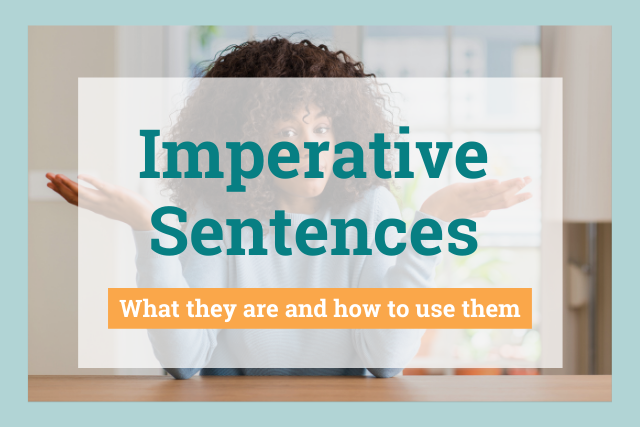
Do you have questions about imperative sentences?
Read this post to find answers.
It includes plenty of information.
It will make understanding imperatives easy!
If you’re really paying attention, you might have noticed that I included an example of each of the four sentence types in that post opener, including an imperative sentence. Read on to learn more and to see over 40 examples of imperative sentences!
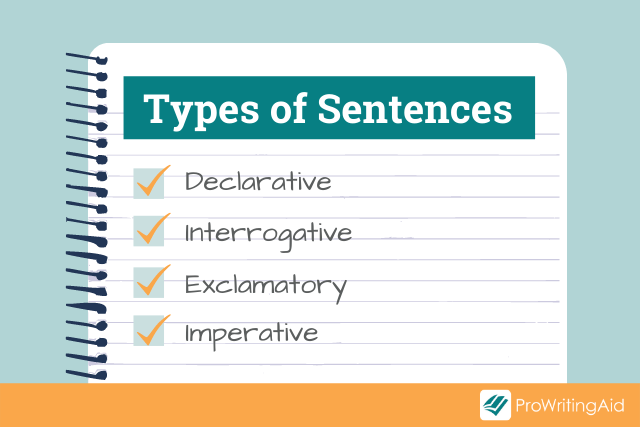
What Are the Four Types of Sentences?
These are the categories for the four types of sentences: declarative, interrogative, exclamatory, imperative.
From these descriptions, see if you can determine which type is represented in the four sentences I used to open the post.
- Declarative sentences make a statement or express an opinion. They end with a period.
- Interrogative sentences ask a question and end with a question mark.
- Exclamatory sentences express powerful emotion—surprise, joy, anger, for example—and end with exclamation points.
- Imperative sentences make a command. They can end with a period or an exclamation point.
Take a moment to go back and evaluate the four sentences that opened the post. Then check your answers!
Answers:
1. Interrogative, 2. Imperative, 3. Declarative, 4. Exclamatory
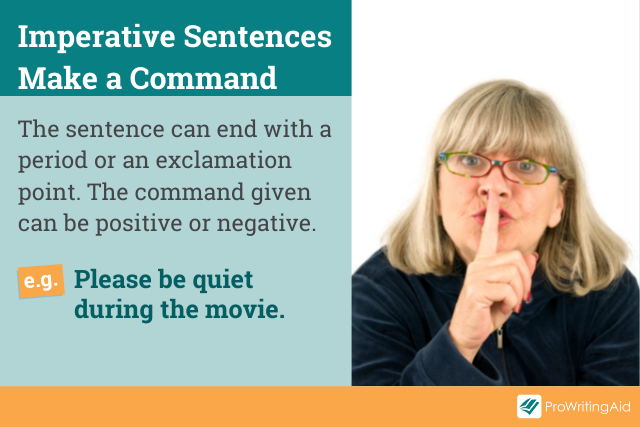
Positive and Negative Imperative Sentences
The command given in an imperative sentence can be positive or negative, meaning it can be a “do” command or a “do not” command. In positive imperatives, the “do” is often implied, meaning the word “do” is not directly stated. In negative imperatives, the “do not” (or don’t) is stated directly.
Example 1:
Positive: Jump in the pool!
Negative: Do not jump in the pool!
Example 2:
Positive: Slow down!
Negative: Don’t drive so fast!
Is It an Imperative or an Exclamatory Sentence?
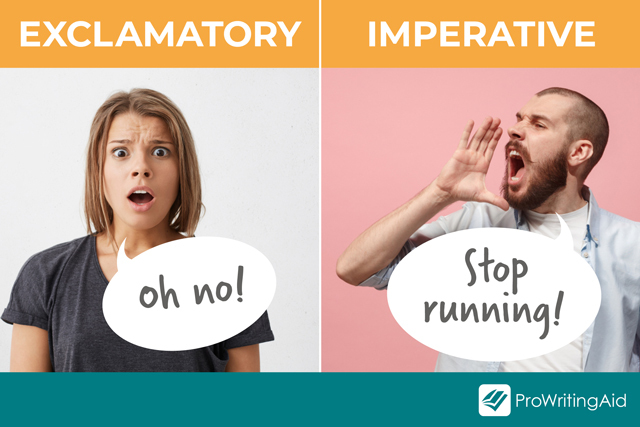
You’ve likely noticed that some of the imperative sentence examples I’ve given so far end with an exclamation point, but that doesn’t make them exclamatory sentences.
What’s the difference?
Imperative sentences always give commands. Exclamatory sentences don’t.
The purpose of exclamatory sentences is to express observations or make statements with extra emotional intensity, as indicated through that exclamation point. An exclamatory sentence isn’t a command.
The purpose of imperative sentences is to give commands. If the command comes with an exclamation mark, the mark is there to add urgency to that command. To soften the command, use a period. To add politeness, include a “please.”
Imperative Verbs and the Imperative Mood
While verb tenses tell us when a verb occurred or will occur (past, present, future, etc.), verb moods tell us how that verb is expressed.
One of the verb moods is the imperative mood, which is the mood that forms a command. Imperative verbs often start imperative sentences.
For example,
- Stop!
- Give that back!
- Clean your room.
- Please change the channel.
Yes, “Stop!” is a single verb and a complete sentence all on its own when it is used as a command. (If you’re confused, this will make more sense when you read on about the subject of imperative sentences, so keep going!)
The last example starts with “please,” but don’t let that word distract you. The purpose of the sentence is still to issue a command, and the imperative verb “change” leads that command.
Imperative or Exclamatory? Test Yourself!

Which of these sentences are examples of imperative sentences? Which are examples of exclamatory sentences? Give yourself bonus points if you can identify the movies examples 7–15 are from!
The rainbow is gorgeous!
Take a picture of the rainbow!
I missed the turn!
Turn left!
Don’t drink the water!
This water tastes disgusting!
They may take our lives, but they’ll never take our freedom!
Say hello to my little friend!
You’re gonna need a bigger boat!
Pay no attention to the man behind the curtain!
I’ll get you, my pretty, and your little dog too!
Here’s Johnny!
To infinity and beyond!
Run, Forrest, run!
(a) Look at me. (b) Look at me. (c) I am the Captain now!
Answers:
1. Exclamatory, 2. Imperative, 3. Exclamatory, 4. Imperative, 5. Imperative, 6. Exclamatory, 7. Exclamatory, 8. Imperative, 9. Exclamatory, 10. Imperative, 11. Exclamatory, 12. Exclamatory, 13. Exclamatory, 14. Imperative, 15. (a) Imperative (b) Imperative (c) Exclamatory
Bonus points for the films:
7. Braveheart, 8. Scarface, 9. Jaws, 10. and 11. The Wizard of Oz, 12. The Shining, 13. Toy Story, 14. Forrest Gump, 15. Captain Phillips
What Are the Functions of Imperative Sentences?
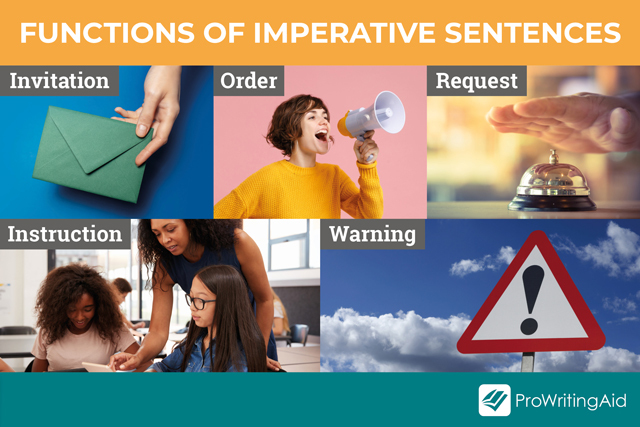
The function of imperative sentences is to give commands, but that doesn’t mean they only do the work of drill sergeants or bossy older siblings. Imperative sentences, and the commands they give, have distinct tones and intents and generally fit into one of the following categories:
Invitation: Commands can be welcoming! When your friend says “Come over and swim in my pool tomorrow” they are issuing a generous command: an invitation.
Order: This would be the work of that bossy sibling. “Get out of my room!” or “Tell Mom I’ll be home later.”
Request: Think of this as a more polite order. A doctor’s office may leave a voicemail saying, “Please call us back at your earliest convenience” or send an email stating “Please use cash or credit card to pay your balance.”
Instruction: Learning how to bake at grandma’s house? She might say “Now mix in the chocolate chips,” as a command of instruction.
Advice or Warning: Good friends give honest advice—“Change your outfit”—and (hopefully) wise warnings: “Don’t go out with him (or her).”
Who Is the Subject of an Imperative Sentence?
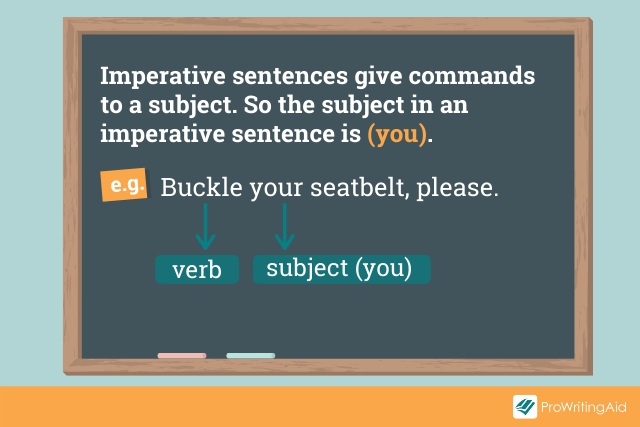
Every sentence has a subject and verb, and expresses a complete thought. The verb tells us what the subject is doing or what state of being the subject holds.
- She owns the company. (declarative sentence)
Subject = She, verb = owns
- Johnny buckled his seat belt. (declarative sentence)
Subject = Johnny, verb = buckled
- The mountain is so high! (exclamatory)
Subject = mountain, verb = is
Imperative sentences, though, aren’t about a subject; they give commands to a subject. So who is that subject on the receiving end of the command?
The answer: “you.” In proper grammatical terminology, that subject is known as “you understood” and is written as (you).
Let’s take the declarative sentence about Johnny and turn it into an imperative. Imagine you’ve loaded Johnny into his seat and say,
- “Buckle your seat belt, please.”
Subject = (you), verb = buckle
And that same subject (you) would also be the subject for the sentence Stop!
But what if you had said, “Johnny, buckle your seat belt, please.” Is the subject now Johnny?
Nope. Grammatically, the subject is (you) as it is for all imperative sentences, even if a specific audience is included in the statement.
- Everyone hide!
- Passengers, please remain seated.
- Don’t speak in that tone, Pat.
In each of these examples, as with almost all imperative sentences, the command is given from the second-person point of view—the speaker is talking to (you)—and the subject is simply (you).
How Is the Word Imperative Used in a Sentence?
So far, you’ve seen the word “imperative” used to define or label a type of sentence, and you know sentences categorized as imperative express urgent, or at least important, commands. The words “urgent” and “important” help clarify what “imperative” means when it is used in a sentence rather than to identify a type of sentence.
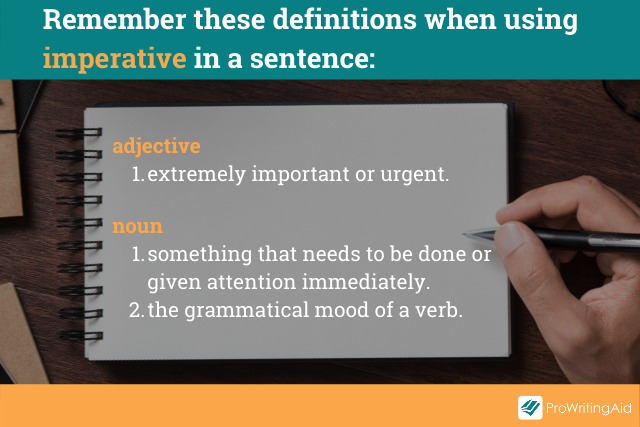
- an adjective that means “extremely important or urgent”
- a noun that means “something that needs to be done or given attention immediately”
- a noun identifying the grammatical mood of a verb (we’ve covered this one already)
Examples of the Word Imperative Used as an Adjective
- Food and water are imperative for survival.
- If you want to get better, taking your medicine is imperative.
- “It is imperative that the governing bodies take note of these findings and work together to protect athletes now and in the future.” (Professor Rick Molloy in sciencedaily.com)
- “For me, it’s morally imperative that we raise the minimum wage to a living wage that’s at least $15 an hour.” (Bernie Sanders in The Guardian)
Examples of the Word Imperative Used as a Noun
- Ending gun violence is not an option, it is an imperative.
- Self-care is an imperative for those who want to live happy and healthy lives.
- “Sleep is not optional. It’s a health imperative, like eating, breathing and physical activity.” (Dr. Judith A. Owens, The New York Times)
- “Minimum-wage workers and activists say $15 an hour is a moral and economic imperative.” (businessinsider.com)
And here’s a double-dipper just for fun:
- If you’re a drill sergeant, it is imperative that you know how to give imperatives.
If you still find that you’re not clear on all the definitions, ProWritingAid offers an easy fix. The Word Explorer is your one-stop for all things definitions, synonyms, examples, rhymes, collocations, quotes, and more. Request a free trial and try it today!
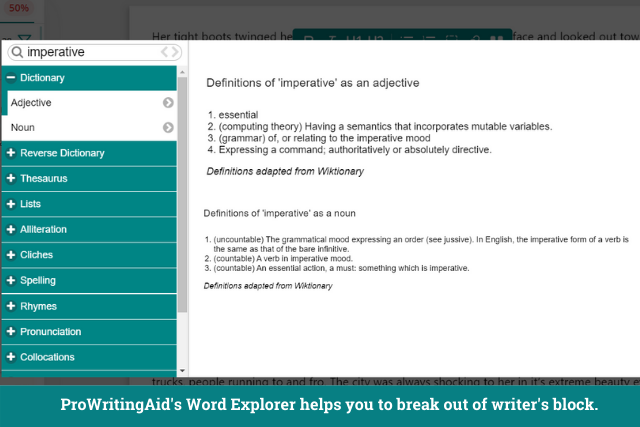
Imperatives Are Everywhere!
Imperatives comprise a significant amount of our everyday communication. We regularly use words to give orders, make requests, extend invitations, provide instruction, and offer advice.
You’ve probably said things today that reflect the commands given in some of these imperative sentences:
- Pass the TV remote.
- Be kind.
- Turn up the music!
- Tell me more.
- Come over for tea.
- Read a book.
- Stop whining!
- Watch this!
Pay attention and you’ll quickly realize we are immersed in imperatives (that was one right there!). Listen to yourself and others (there’s another). Be aware as you read books, watch movies, and sing along to music (and another), and you’ll find imperatives everywhere.


